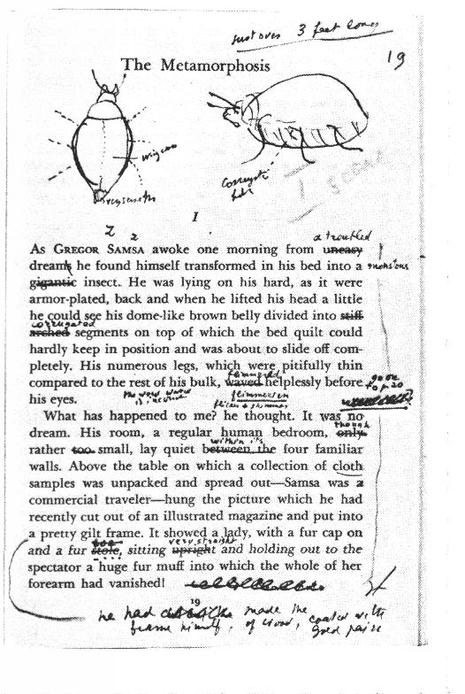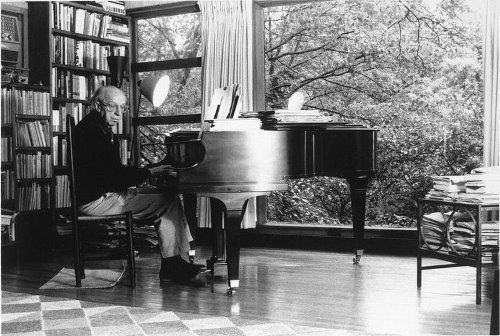Author: Greg Ross
Misterioso
Expression markings used by Australian composer Percy Grainger:
- “Louden lots”
- “Soften bit by bit”
- “Lower notes of woggle well to the fore”
- “Glassily”
- “Sipplingly”
- “Bumpingly”
- “Hammeringly”
- “Bundling”
- “Clatteringly”
- “Like a shriek”
- “Very rhythmic and jimp”
- “Rollikingly”
- “Hold until blown”
- “Jogtrottingly”
- “Easygoingly but very clingingly”
Musical directions in Erik Satie’s piano works:
- “Wonder about yourself”
- “Provide yourself with shrewdness”
- “Alone, for one moment”
- “Open the head”
- “Superstitiously”
- “In a very particular way”
- “Light as an egg”
- “Like a nightingale with a toothache”
- “Moderately, I insist”
- “A little bit warm”
- “Very Turkish”
One of Satie’s directions — “Very lost” — might have been unnecessary.
Round Trip

Frustrated in trying to describe higher topology abstractly to students, Xian Wang invented a model train that can hug either side of a track:
It is therefore a primary object of the present invention to provide an electrically-operated ornament travelling on a rail which can be used to explain the Mobius Theorem. … In general textbooks, this advanced mathematic rule is usually explained by demonstrating a body circularly moving on a front and a reverse side of a twisted two-ends-connected belt. Most people can not understand and imagine the theorem from such explanation and demonstration.
Of course, once you’ve built one you can put it to other uses:

Hostilities
A 10×10 chessboard contains 41 rooks. Prove that there are five rooks that don’t attack one another.
Wish You Were Here

Australia’s tallest mountain and most populous city were named for people who never visited the country. Mount Kosciuszko was named after Polish military hero Tadeusz Kosciuszko, because of its resemblance to a prehistoric mound in Kraków, and Sydney was named for British politician Thomas Townshend, Lord Sydney.
Matchups
Titles of “in rem” condemnation cases, in which the government sues to justify the seizure of an asset:
- United States v. 11 1/4 Dozen Packages of Article Labeled in Part Mrs. Moffat’s Shoo Fly Powders for Drunkenness, 40 F. Supp. 208 (W.D.N.Y. 1941)
- United States v. 2,116 Boxes of Boned Beef, etc., 726 F.2d 1481
- United States v. Approximately 64,695 Pounds of Shark Fins, 520 F.3d 976 (9th Cir. 2008)
- United States v. 2,507 Live Canary Winged Parakeets, 689 F. Supp. 1106 (S.D. Fla. 1988)
- United States v. One Lucite Ball Containing Lunar Material (One Moon Rock) and One Ten Inch by Fourteen Inch Wooden Plaque, 235 F. Supp. 2d 1367 (S.D. Fla. 2003)
- United States v. Article Consisting of 50,000 Cardboard Boxes More or Less, Each Containing One Pair of Clacker Balls, 413 F. Supp. 1281 (D. Wisconsin 1976)
In 1836 a flotilla of brandy casks washed ashore on the south coast of England, and an ownership dispute arose between a local property owner and the crown. Unfortunately for William IV, the case was recorded as The King v. Forty-Nine Casks of Brandy.
Morphology

This is the opening page of “The Metamorphosis,” from Vladimir Nabokov’s teaching copy. Kafka’s novella held a special interest for Nabokov, who was a trained entomologist. From his lecture notes at Cornell:
Now, what exactly is the ‘vermin’ into which poor Gregor, the seedy commercial traveler, is so suddenly transformed? It obviously belongs to the branch of ‘jointed leggers’ (Arthropoda), to which insects, and spiders, and centipedes, and crustaceans belong. … Next question: What insect? Commentators say cockroach, which of course does not make sense. A cockroach is an insect that is flat in shape with large legs, and Gregor is anything but flat: he is convex on both sides, belly and back, and his legs are small. He approaches a cockroach in only one respect: his coloration is brown. That is all. Apart from this he has a tremendous convex belly divided into segments and a hard rounded back suggestive of wing cases. In beetles these cases conceal flimsy little wings that can be expanded and then may carry the beetle for miles and miles in a blundering flight. … Further, he has strong mandibles. He uses these organs to turn the key in a lock while standing erect on his hind legs, on his third pair of legs (a strong little pair), and this gives us the length of his body, which is about three feet long. … In the original German text the old charwoman calls him Mistkafer, a ‘dung beetle.’ It is obvious that the good woman is adding the epithet only to be friendly. He is not, technically, a dung beetle. He is merely a big beetle.
“Curiously enough,” he added, “Gregor the beetle never found out that he had wings under the hard covering of his back. This is a very nice observation on my part to be treasured all your lives. Some Gregors, some Joes and Janes, do not know that they have wings.”
Square Deal

A “coffin,” or killer problem, from the oral entrance exams to the math department of Moscow State University:
Construct (with ruler and compass) a square given one point from each side.
Handiwork
In a 1965 story on the accidental death of a local millworker, Charlotte News police reporter Joseph Flanders wrote, “It was as if an occult hand had reached down from above and moved the players like pawns upon some giant chessboard.”
This struck Flanders’ fellow reporters as hilariously purple, and they founded the Order of the Occult Hand to immortalize him by sneaking the phrase into as many stories as possible. This has evolved into an in-joke among American journalists:
- “It was as if an occult hand had somehow palmed the film.” — Deborah Caulfield, “Disney Pulls ‘Wolf’ From Mann in Dispute,” Los Angeles Times, Nov. 7, 1983.
- “As the show wears on, your eyelids may slam shut, as if tugged by an occult hand.” — Jay Sharbutt, “FBI’s Untold Stories Told, James Earl Jones Seeks A Few Laughs,” Associated Press, Sept. 26, 1991.
- “It was as if an occult hand was at work, or maybe a screenwriter for one of Mel Brooks’ slapstick comedies.” — Paul Greenberg, “Warren G. Clinton’s Bad Week,” Tulsa World, May 28, 1993.
- “One morning last week, while pondering the daily question of khakis vs. jeans, it was as if an occult hand reached down and plucked the baggy green pants from the hanger and thrust them at me.” — Dennis Rogers, “Snug Fat Clothes and Other Realities of Pre-Boomers,” Raleigh News & Observer, Aug. 3, 1993.
- “It was as if an occult hand had pointed you out to each other.” — Florence Shinkle, “Fated Attractions: How Our Minds (and Our Glands) Make Us Fall in Love,” St. Louis Post-Dispatch, Feb. 14, 1994.
- “Nails, screws, small tools and thingamajigs accumulate and then relocate as if moved by an occult hand to some new hiding spot.” — M.R. Montgomery, “A Place for Everything,” Boston Globe, July 6, 1995.
- “It was as if an occult hand had guided the black sphere down the narrow lane and into the triangle of pins.” — Linton Weeks, “Spares and Strikes,” Washington Post, June 5, 1997.
- “It was as if an occult hand had reached down to throw beleaguered Democrat Donald S. Beyer Jr. a wee crumb on an otherwise bleak night.” — Sean Scully, “Barry vs. Plotkin,” Washington Times, Nov. 7, 1997.
- “When he plays the blues, it is as if some occult hand is guiding his hand over the guitar, channeling the essence of the blues through Clapton.” — Eric Fidler, “Sound Bites: ‘Pilgrim’ (Reprise) – Eric Clapton,” Associated Press, March 23, 1998.
- “We like to think we have earned success, after all, and discount the occult hand of fate.” — David Mehegan, “The Story of E,” Boston Globe, May 14, 2000.
- “It was as if an occult hand had taken Chuck Klosterman’s radio, tuned away from the Top 40 ear candy of Duran Duran and the Stray Cats, and tuned into the satanic debauchery of Motley Crue.” — Eric Hanson, “These Books Rock: ‘Fargo Rock City’ Lauds Metal as Refuge for Teens,” Minneapolis Star Tribune, July 15, 2001.
- “It is as if an occult hand placed Calvino in our country so we could appreciate our own eccentricities,” John Skoyles, “The ‘Hermit’ Emerges in Calvino’s Writings,” Associated Press, April 21, 2003.
“It’s a phrase that has that sense of journalese about it, sort of a campy phrase,” Greenberg told James Janega of the Chicago Tribune in 2004. He holds a Pulitzer and has used the phrase at least six times, “just to keep my standing in good order.”
But Montgomery told Janega that in the modern era the occult hand might be coming to an end. “There’s so much bad writing and so much pretentious writing,” he said, “I’m afraid it would get lost.”
Unquote

“The whole problem can be stated quite simply by asking, ‘Is there a meaning to music?’ My answer would be, ‘Yes.’ And ‘Can you state in so many words what the meaning is?’ My answer to that would be, ‘No.'” — Aaron Copland, What to Listen for in Music, 1939


